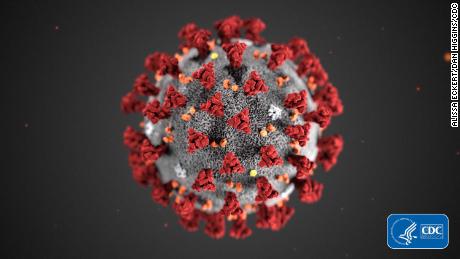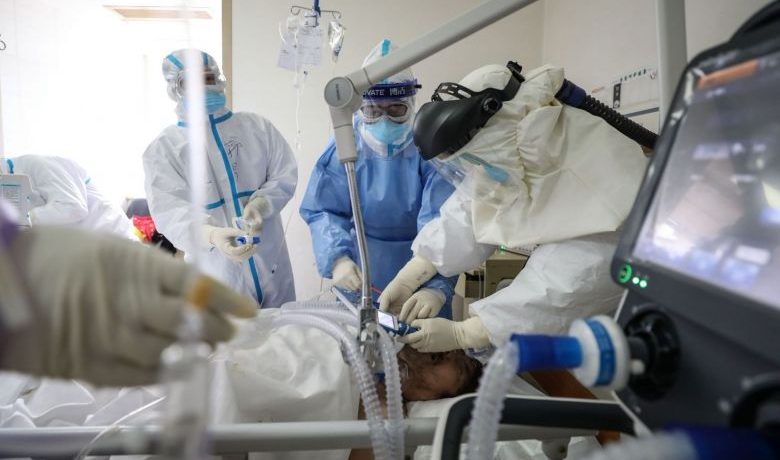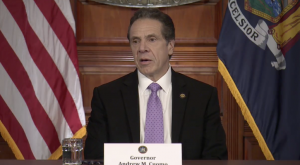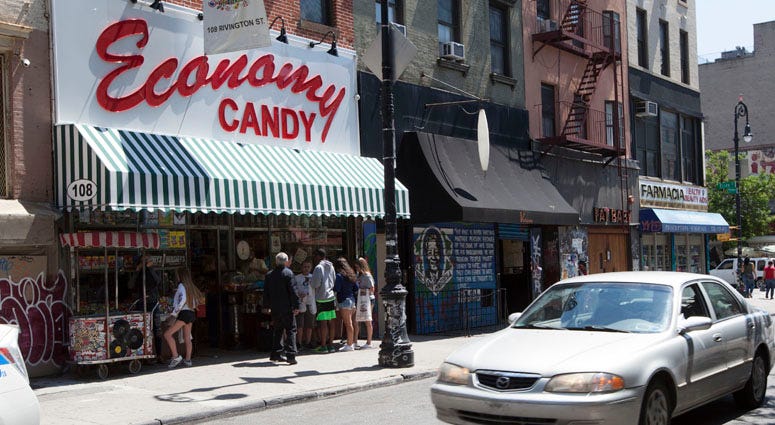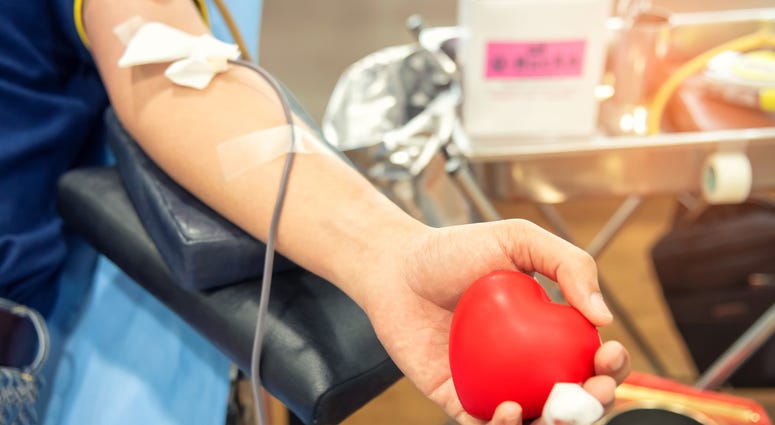
-
How Do You Educate Your Kids about Coronavirus?
Post Views: 926Dr. Carol Vidal, M.D., M.P.H., an adolescent psychiatrist at Johns Hopkins University, speaks with WCBS’ Neil A. Carousso about how you can talk with your children about COVID-19 and protecting those who are most vulnerable in your family.
-
Cuomo Asks Medical Offices for Vital Ventilators to Fight the “War” on Coronavirus
Post Views: 961By Neil A. Carousso
NEW YORK (WCBS 880) – Concern is growing over equipment shortages in hospitals.
“Ventilators are to this war what missiles were to World War II,” said Governor Andrew Cuomo Friday morning.
Cuomo says New York State urgently needs 30,000 ventilators to treat the rising number of coronavirus cases and is asking medical offices to sell unused medical supplies to the State Health Department. He has also called on the federal government to act to get thousands more ventilators in hospitals nationwide.
“Rosie the Rivertor. We need ventilators. That is the key piece of equipment. We can get the beds. We’ll get the supplies, but the ventilator is a specific piece of equipment. These are people with respiratory illnesses,” Cuomo pleaded.
Companies who are able to sell unused medical supplies can call (646) 522-8477 or email COVID19supplies@esd.ny.gov.
“At the end of this when patients are suffering from respiratory illnesses such as pneumonia and respiratory failure that can occur, the only way to keep them alive is to get them on a ventilator and support their respiratory system that way,” said Dr. Brian Bezack, a pediatric pulmonologist based in Commack, Long Island. “As more people are getting tested and more people are getting sick with the virus as it spreads, those more severe cases are the ones that end up in our ICUs and the ones that need the ventilators and we need to have them on hand.”
This is Dr. Bezack’s busy season when children suffering with asthma come in with serious respiratory symptoms exacerbated by the cold air. The past few weeks, he has been inundated with questions based on misinformation surrounding COVID-19 and how it impacts asthmatics.
“I had a patient call me the other day and say, ‘You know, I’ve been reading about asthma, and since my child is on steroids, steroids are not good and it lowers your immune system, and so, I want to take them off their asthma medication,’” Dr. Bezack recalled. “To me, that was probably the most dangerous thing I had heard.”
He emphasized inhaled steroids do not lower one’s immune system. The biggest way for people who have asthma to fight coronavirus or any respiratory illness, Dr. Bezack said, is to have as close to 100 percent control over one’s asthma.
-
Teachers Find New Tools to Educate Students Amid Coronavirus Pandemic
Post Views: 821By Neil A. Carousso
NEW YORK (WCBS 880) – As schools shift to remote learning amid the coronavirus pandemic, teachers are finding useful tools that they may incorporate next school year.
“I think that’s going to be a benefit of this crisis long-term are those teachers that are realizing that these tools can be assets to them, they’re not going to replace them and that their role is still as that guide in the classroom whether it’s face-to-face or remote,” said Alex Urrea, managing partner of Eduscape, which trains K-12 schools on how to integrate Learning Management Systems (LMS) into the classroom.
The company has trained over 750,000 educators on its partner platforms owned by Google and Microsoft.
Urrea says the technology has been available, but some educators have resisted using free platforms like Google for Education and Microsoft Teams.
Coronavirus: 6 Expert Tips for Homeschooling Your Kids
“Right now, if nothing else, the rapid migration to remote teaching and the challenges they’re in, are proving that teachers enhance technology and not the other way around,” Urrea said, adding, “You need good teachers supported by good technology, and right now, I think the technology isn’t failing them, but what’s causing struggles is not enough professional development, historically, on how to get them to use this better during these times.”
He anticipates schools will see the value of making these tools part of the curriculum next year. In many cases, LMS have been available to teachers, but it has been “underutilized,” according to Urrea.
“IT directors and schools must enable those features to work for teachers to be able to use them, especially in this environment,” he said. “Not enough training has taken place in these tools.”
Schools in the Tri-State Area have been closed to prevent the spread of COVID-19.
-
Small Business Owners Try To Stay Afloat, Pay Workers Amid Coronavirus Pandemic
Post Views: 944By Neil A. Carousso
NEW YORK (WCBS 880) – The coronavirus pandemic hit thriving local food and hospitality businesses hardest, halting sit-down eateries and slowing foot traffic as government imposed unprecedented actions to shut restaurants and people practice social distancing in an effort to slow the spread of the deadly disease.
Two weeks ago, Seth Goldstein – the franchisee of three Jersey Mike’s Subs locations on Long Island – was preparing for its annual “Month of Giving” initiative in which the chain projected to donate $8 million from its nationwide sales on March 25 to The Make-A-Wish Foundation. Now, Jersey Mike’s is trying to stay afloat and continue to pay its workers.
“We want to make sure we can pay our full-time people,” Goldstein said, noting he considers all employees who work 40 hours or more a week to be “full-time.” “We got to take care of the people who are taking care of us all the time.”
He will apply for any interest-free loans provided as a stimulus by the federal government.
He slashed hours for students who are now home looking for more work.
Goldstein’s sub shops are currently open from 11 AM-8 PM. Its normal hours are 10 AM-9 PM. He is anticipating Jersey Mike’s will further reduce operating hours with the sub shop open only for take-out and delivery.
In an effort to slow the spread of COVID-19, New York Gov. Andrew Cuomo announced this week that all restaurants and bars in New York, New Jersey and Connecticut will be closed to dining in and may only provide food take-out and delivery services.
“We are seeing about a 30-35 percent drop-off in the sandwiches that we make,” said Goldstein who measures his business by “bread count.”
As an entrepreneur from the time he graduated college, he understands the importance of making adjustments. Goldstein’s foray into business was when he bought a piece of the Baskin-Robbins store he worked at as a 14 and 15 year old with his life savings and then some.
“I’m hoping that people still come out when they eat lunch,” said Goldstein who now sees it as inevitable that technology will disrupt the fast-food business.
“I think that a lot of people will be working from home on a split-basis going forward. I think that our business has changed a little bit in the fact that a lot of our online ordering will be augmented here, a lot of the delivery systems will be augmented here.”
Even an 83 year old business on the Lower East Side is seeing an unprecedented decline in sales this week.
“We’ve gotten through 9/11, we’ve gotten through the hurricane, Sandy, we will work to get through this as well, but we’ve never had to close down,” said Mitchell Cohen, the third-generation owner of Economy Candy – an old-fashioned candy store that carries all the classics from Black Jack to Clove Gum and 2,000 more selections.
Cohen’s store was impacted by President Donald J. Trump’s travel ban on foreigners coming to the U.S. from most European nations. Economy Candy thrives on tourist food traffic.
He has adjusted work schedules and reduced in-store hours for workers to for health reasons and insists he needs to pay all his employees.
“[I need to > take care of them so they can take care of their bills and their families,” said Cohen.
During a devastating week for in-store sales in an eerily vacant Lower Manhattan, the former Wall Street analyst who grew up in his family’s candy shop realized new ways to be efficient and market to potential new customers.
“I don’t believe I’ve ever gotten this much in the weeds on scheduling and inventory management and that kind of thing,” Cohen said laughing. “Luckily, we still have suppliers that are still delivering because they need the business, too, so there could be a trickle-down effect. If we could get some business online, I could get some orders to other people and I keep on going down the road.”
For many small business owners across the country, the impact of the pandemic was felt immediately.
Richard Bayliss, owner of Nu-Way Cleaners and Tailors in White Plains, which has been in the family for 75 years, said he didn’t see this coming.
“It wasn’t a gradual thing where you could turn around and say, ‘Let’s try to do this, let’s try to do that,” he told WCBS 880’s Mack Rosenberg.
Bayliss relies on delivery service as one of his main sources of income. Nu-Way usually delivers to 150 homes per day, but Bayliss says it’s down to a quarter of that now.
When you walk into nu-way, you feel like you’re in a factory. Pants and jackets fly from clotheslines overhead, while cashiers at several registers figure out what goes where, and how much it’ll cost you. Bayliss employs around 30 people. Most of them have worked for him for at least 10 years.
“You got these people that are working people. It just breaks my heart because I don’t really want to lay anybody off. We’re cutting their hours back. It’s hard when you go up to them and they’re supposed to work until 6, and you have to say ‘Well do you want to go home at 1 today,'” he said.
Bayliss says morale is still strong in the store, and there are no plans to close.
-
Blood Drives Seeking Donors As Supply Slows Down
Post Views: 862NEW YORK (WCBS 880) — The New York Blood Center says that 75 percent of its incoming blood supply was interrupted when schools, business and religious institutions closed because of coronavirus.
Andrea Cefarelli, the Senior Executive Director of Donor Recruitment for the New York Blood Center, says they’ve increased hours at their centers in an effort to bring in more donors.
“We’ve added days and added shifts so many days we are open 12 hours per day, in the hopes that healthy individuals will come out to donate and give the gift of life,” Cefarelli told WCBS 880’s Neil A. Carousso.
The centers have switched from walk-ins to appointment only, so that they can manage a safe distance between donors.
The need for blood is constant, and right now, we have an urgent need. If you are healthy and well, please make an appointment at one of our donor centers ASAP: https://t.co/JMOlBf9oy3 pic.twitter.com/WdkSOpqkbE
— NY Blood Center (@NYBloodCenter) March 17, 2020
“In New York, we usually have about 30,000 blood donations per month,” Cefarelli said. “We’ve seen cancellations of 25,000”
The centers want to remind potential donors that a single pint of donated blood can be used to save multiple lives.
The center’s 19 locations across New York and New Jersey do not test for novel coronavirus.
News Stories
Social Feeds

VIDEO: Told the airline to book us on the next flight out (SPONTANEOUS TRIP!)

VIDEO: The Taylor Swift Effect | WCBS Business Breakfast

VIDEO: Future of NYC | WCBS Business Breakfast

VIDEO: Reasons for New Yorkers to be Optimistic | WCBS Business Breakfast

VIDEO: NYC's AI Chatbot | WCBS Business Breakfast


